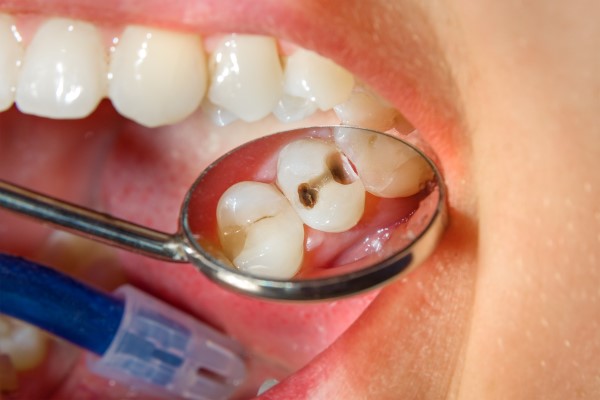Cavity Treatment: How to Treat the 3 Most Common Types of Cavities

Understanding the symptoms and treatment options for different types of cavities can ensure that you get the appropriate cavity treatment so you do not lose the tooth and can eliminate discomforting symptoms. While every patient receives a personalized plan for cavity treatment, there are basic details to become familiar with regarding the diagnostic and treatment process.
A review of the symptoms and treatment for different cavity types
The three types of cavities are a smooth surface cavity, pit and fissure cavity and root cavity. Each type poses a unique concern, has unique symptoms and requires its own treatment process. This review highlights the different cavity types and how a general dentist can treat each one.
Smooth surface cavities
Smooth surface cavities are perhaps the least common cavity type. They are not as severe a concern as pit and fissure cavities and roto cavities, but they do require prompt cavity treatment. Minor cases of smooth surface cavities may be able to be repaired through fluoride treatment, although more severe smooth surface cavities likely require a dental filling. Smooth surface cavities can develop into more serious cavity types if left untreated, compromising the long-term health of the tooth, and tooth loss could occur if left untreated for too long.
Pit and fissure cavities
Pit and fissure cavities occur on the chewing surface of teeth, particularly teeth that are located farther back in the mouth, such as the premolars, molars and wisdom teeth. If detected early, pit and fissure cavity treatment can include fluoride treatment or dental sealants. Moderate-sized cavities may need a dental filling, and severe pit and fissure cavities require roto canal therapy or a dental crown in many cases. If left untreated, pit and fissure cavities could eventually worsen and lead to severe symptoms and tooth loss.
Root cavities
Root cavities occur closer to the root of a tooth. This commonly occurs in older patients who have experienced gum erosion or deep gum pockets. Often, root cavities are repaired with a dental filling. More severe root cavities, however, require root canal therapy, particularly if the decay has reached the pulp chamber. If root cavities cannot be effectively treated with fillings or root canal therapy, dental crowns or teeth replacement may be necessary.
Tips for cavity prevention
The best way to deal with dental cavities is to prevent them from developing in the first place. Patients can significantly reduce the risk of dental cavities by practicing good oral hygiene, brushing, flossing and using mouthwash regularly. Eating a low-sugar diet is also helpful in reducing the risk of acidic reactions in the mouth that break down tooth enamel.
Schedule a visit for cavity treatment with our dental team
If you have symptoms of a cavity and feel as if you need cavity treatment, then contact our dental team today to set up a convenient time to visit. We can diagnose the exact type of cavity you have and offer prompt treatment.
Request an appointment here: https://www.ohiocosmeticdentists.com or call Ohio Cosmetic Dentists at (614) 503-5240 for an appointment in our Columbus office.
Check out what others are saying about our dental services on Yelp: General Dentist in Columbus, OH.
Recent Posts
A general dentist shared some ways to help prevent bad breath. This is a topic no one wants to discuss. Bad breath happens to everyone at one point or another. If you take proper precautions, you can avoid having bad breath. We should openly talk about this taboo topic. The more we talk about it, the…
You can have restorative dental procedures from your general dentist to replace defective or damaged parts of your teeth. Restorative procedures are used to replace broken or missing teeth and are among the most common treatments and procedures that dentists handle regularly. They restore the function and aesthetics of teeth and supporting structures while helping…
One aim of general dentistry is to make the patient’s experience as positive as possible. A dentist who is good at their job will achieve this feat in two ways. First, they will use proactive, preventative measures that keep intensive procedures to a minimum. Second, the dentist will use every tool at their disposal to…
If a general dentist recommends a dental crown, there are a variety of reasons why. Crowns can be used for cosmetic corrections as well as for protection and support. These dental restorations may seem intimidating to those who have never had one, but they do not have to be. Here are some questions to ask…


